|
|
|
Sort Order |
|
|
|
Items / Page
|
|
|
|
|
|
|
| Srl | Item |
| 1 |
ID:
100141


|
|
|
| 2 |
ID:
177611
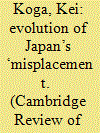

|
|
|
|
|
| Summary/Abstract |
This article argues that since the Meiji Restoration, the degree of Japan’s misplacement has changed, depending on its structural power and ability to shape the concept of ‘Asia’ as a region. More specifically, there are three historical turning points: first, from the Meiji Restoration to the Pacific War (hard misplacement); second, post-World War II to the end of the Cold War (soft misplacement); and third, post-Cold War to the present (relative well-placement). In each period, Japan was faced with a different concept of ‘Asia’ and attempted to modify its identity and roles accordingly. The degree of ’misplacement’ is thus not static, but elastic, and such a status is not a permanent attribute of the state. Changes occur when states undertake a role location process, particularly during or after a change in the regional environment.
|
|
|
|
|
|
|
|
|
|
|
|
|
|
|
|
| 3 |
ID:
080552
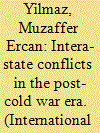

|
|
|
| 4 |
ID:
100891
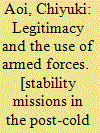

|
|
|
|
|
| Publication |
London, Routledge, 2011.
|
| Description |
xiv, 287p.
|
| Standard Number |
9780415559546, hbk
|
|
|
|
|
|
|
|
|
|
|
|
Copies: C:1/I:0,R:0,Q:0
Circulation
| Accession# | Call# | Current Location | Status | Policy | Location |
| 055542 | 355.4/AOI 055542 | Main | On Shelf | General | |
|
|
|
|
| 5 |
ID:
186560
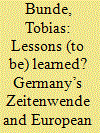

|
|
|
|
|
| Summary/Abstract |
In Germany, the Russian war on Ukraine is widely perceived as a “Zeitenwende,” a watershed moment undermining key foreign policy beliefs. Despite mounting evidence contradicting them, German elites previously failed to adapt core beliefs regarding Russia and the use of force because these beliefs were not only deeply embedded in largely uncontested identity constructions but also shaped the definition of economic interests, which in turn made ideational adaptation more costly. Moreover, Germany’s extraordinarily beneficial geopolitical situation in the post-Cold War era meant that the country could afford not to learn. Although the “Zeitenwende” will trigger significant change, it is unclear which lessons exactly Germans will now be learning and how far that adaptation will go. Given Germany’s key position in Europe and its previous role in shaping the European and transatlantic policy toward Russia, the results of these learning processes will significantly shape the emerging European security order.
|
|
|
|
|
|
|
|
|
|
|
|
|
|
|
|
| 6 |
ID:
132527


|
|
|
|
|
| Publication |
2014.
|
| Summary/Abstract |
This article aims to discuss and analyze the emergence and evolution of Turkey's role as a model in the international system in three different periods, 1991-93, 2003-05 and 2010-12. To this end, it methodologically uses the main concepts of role theory: role expectations, role conceptions and role performance. Focusing on K.J. Holsti's example national role conception category in particular, it seeks to reveal the major similarities and differences between the role expectations that have enacted the role conception known as the Turkish model, and compare the impact of these expectations on role performance in each of these three cases. The major argument of the article is that the sustainability of the model's national role conception depends foremost on Turkey's political and economic capabilities that directly influence its role performance.
|
|
|
|
|
|
|
|
|
|
|
|
|
|
|
|
| 7 |
ID:
022864


|
|
|
|
|
| Publication |
Sept 2002.
|
| Description |
357-372
|
|
|
|
|
|
|
|
|
|
|
|
|
|
|
|
| 8 |
ID:
132575
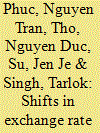

|
|
|
|
|
| Publication |
2014.
|
| Summary/Abstract |
A number of studies have found that more flexible exchange rate regimes tend to be associated with greater inflation persistence. This paper investigates whether this finding is applicable to Vietnam from 1992 to 2010. We find no evidence to suggest that inflation persistence in Vietnam was systematically higher under a "soft" peg exchange rate regime than under a "hard" peg. Rolling regressions suggest that inflation persistence peaked during 2004 to 2007, when Vietnam was governed by what may be characterized as a hard-peg regime.
|
|
|
|
|
|
|
|
|
|
|
|
|
|
|
|
| 9 |
ID:
155399
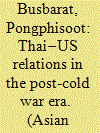

|
|
|
|
|
| Summary/Abstract |
This article examines the transformation of Thailand’s ties with the United States away from its “special relationship” in the Cold War, when Thailand viewed the United States as an indispensable power. The relationship in the post-Cold War period is marked by significant disagreements. Structural theories predict that China’s rise and the regional uncertainty it has created would lead Thailand to strengthen its alliance with the United States as part of a hedging strategy. In recent decades, however, the United States has failed to provide the assistance Thailand expected and its criticism of the Thai military coups of 2006 and 2014 are perceived as illegitimate interference in Thai affairs. As domestic politics plays an increasing role in Thai foreign policy, Thailand is distancing itself from the United States and moving closer to China.
|
|
|
|
|
|
|
|
|
|
|
|
|
|
|
|
| 10 |
ID:
158045
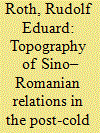

|
|
|
|
|
| Summary/Abstract |
This article looks, from a Romanian perspective, at developments in Sino–Romanian relations over the past 25 years, with a focus on two factors that shaped bilateral cooperation: the political matrix of interactions and the mutual pursuit of economic and security benefits. In this context, the article argues that, although the existing pattern of cooperative outputs and the two states’ behavioural dynamics were largely by-products of a divergent interplay of endogenous variables and exogenously-articulated influences, Sino–Romanian relations in the post-1989 era were mainly characterised by an adaptive inertia, circumscribed by a tradition of tacit, formal, and informal (positive) cooperation.
|
|
|
|
|
|
|
|
|
|
|
|
|
|
|
|
| 11 |
ID:
133284
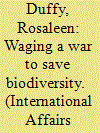

|
|
|
|
|
| Publication |
2014.
|
| Summary/Abstract |
This article examines the rise in militarized approaches towards conservation, as part of a new 'war for biodiversity'. This is a defining moment in the international politics of conservation and needs further examination. The claims that rhinos and elephants are under threat from highly organized criminal gangs of poachers shapes and determines conservation practice on the ground. Indeed, a central focus of the 2014 London Declaration on the Illegal Wildlife Trade is the strengthening of law enforcement, and recent policy statements by the US government and the Clinton Global Initiative also draw the link between poaching, global security and the need for greater levels of enforcement. Such statements and initiatives contribute substantially to the growing sense of a war for biodiversity. This article offers a critique of that argument, essentially by asking how we define poachers, and if militarized approaches mean conservationists are becoming more willing to engage in coercive, repressive policies that are ultimately counterproductive. Further, this article examines how the new war for biodiversity is justified and promoted by referring to wider debates about intervention in a post-Cold War era; notably that the international community has a responsibility towards wildlife, especially endangered species, and that military forms of intervention may be required to save them.
|
|
|
|
|
|
|
|
|
|
|
|
|
|
|
|
|
|
|
|
|